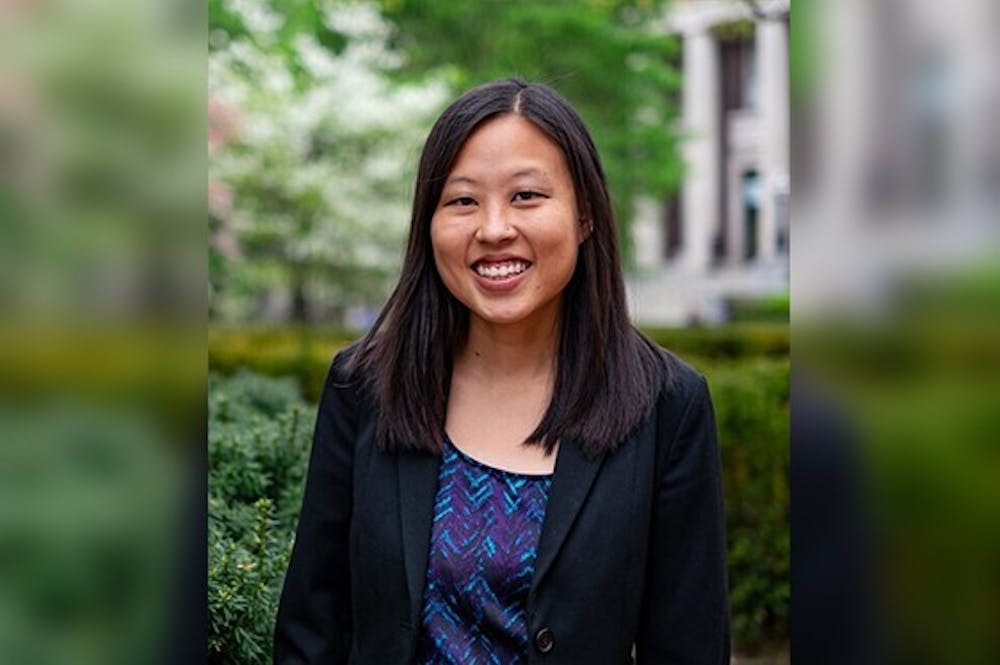
Tiffany Huang, one of the nine researchers selected to join the 2021 cohort of Penn Provost’s Postdoctoral Fellows for Academic Diversity program, will be working with Professor of Sociology Wendy Roth in the School of Arts and Sciences to study race and immigration with a particular focus on second-generation Asian immigrants. (Photo from Tiffany Huang)
Nine researchers were selected to join the 2021 cohort of the Penn Provost’s Postdoctoral Fellows for Academic Diversity program.
The postdoc fellowship is part of an initiative to increase the diversity of the Penn research community, according to the announcement from Senior Vice Provost for Research Dawn Bonnell and the Office of the Vice Provost for Research. The fellows — who will conduct research across five of Penn’s schools — come from a variety of backgrounds and present a wide breadth of research interests from immigration and race to metabolic diseases.
Most of the selected fellows will begin their positions in July and will receive mentorship from Penn faculty members who share their research interests. The fellowship appointment will last for one year with the possibility of annual renewal for the second and third years of the program based on the fellow's performance and an agreement from the fellow's faculty mentor.
The program will allow fellows to attend workshops to prepare them for roles in academia. Fellows will receive a $54,000 stipend during the first year of their role with opportunities to increase the stipend by $2,000 increments in the following years of the program. Fellows are also allocated funds for expenses related to travel, research and relocation for the program.
Postdoctoral fellow Onome Osokpo, who earned a Nursing Ph.D from Penn in 2021 and is a research fellow at the Nursing school’s NewCourtland Center for Transitions and Health, said that he is interested in researching health care for marginalized groups.
“[I'm] broadly interested in factors — structural, cultural, [and] social conditions — that influence how marginalized communities [and] vulnerable populations manage their chronic illnesses," Osokpo said. "I’m also very interested in how those factors influence health care utilization and access to health care.”
Osokpo added that the fellowship gave him the opportunity to access the University's resources and to collaborate with researchers across the University's departments and schools.
Tiffany Huang, who earned her Ph.D in sociology at Columbia University in June, will work with professor of Sociology Wendy Roth to study race and immigration, specifically second-generation Asian immigrants. Huang described one of the projects she plans to work on during the program about the role of race in college admissions.
"One [project] is related to my dissertation which is about private college consulting and the role that private college consultants play in the admissions process including how they and the students they work with think about race, identity, and diversity in college admissions," she said. "So I will be working on turning that project into a book manuscript and a book proposal.”
Huang also echoed Osokpo's excitement to form connections through the research program.
"[I'm] looking forward to just meeting everyone in the Sociology department," she said. "I think it’s always a great learning experience to get to meet new people in a department [and] to find out what the community is like there."
Postdoctoral fellow Jaclyn Welles earned her Ph.D in cell and molecular physiology from the Pennsylvania State College of Medicine in January. She will conduct research on metabolic diseases at the Penn Medicine Institute for Diabetes, Obesity and Metabolism in Assistant Professor of Physiology Paul Titchenell's lab.
In addition to the resources and connections offered through the program, she noted the significance of the fellowship to someone from an underrepresented background.
“I do a lot of mentoring and mentorship, so I’m really excited for my mentees to see that this is possible," Welles said. "Especially as an [underrepresented minority], it’s few and far in between finding first-generation Black women who finished their Ph.D's in biomedical science."
The Daily Pennsylvanian is an independent, student-run newspaper. Please consider making a donation to support the coverage that shapes the University. Your generosity ensures a future of strong journalism at Penn.
Donate




